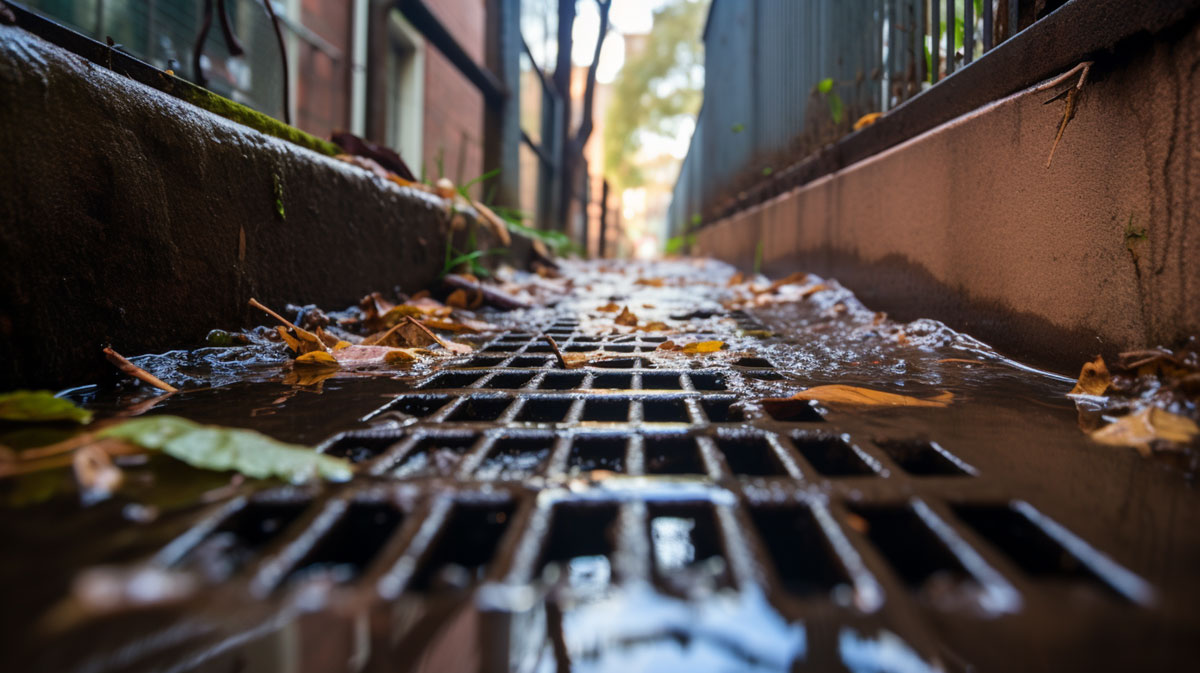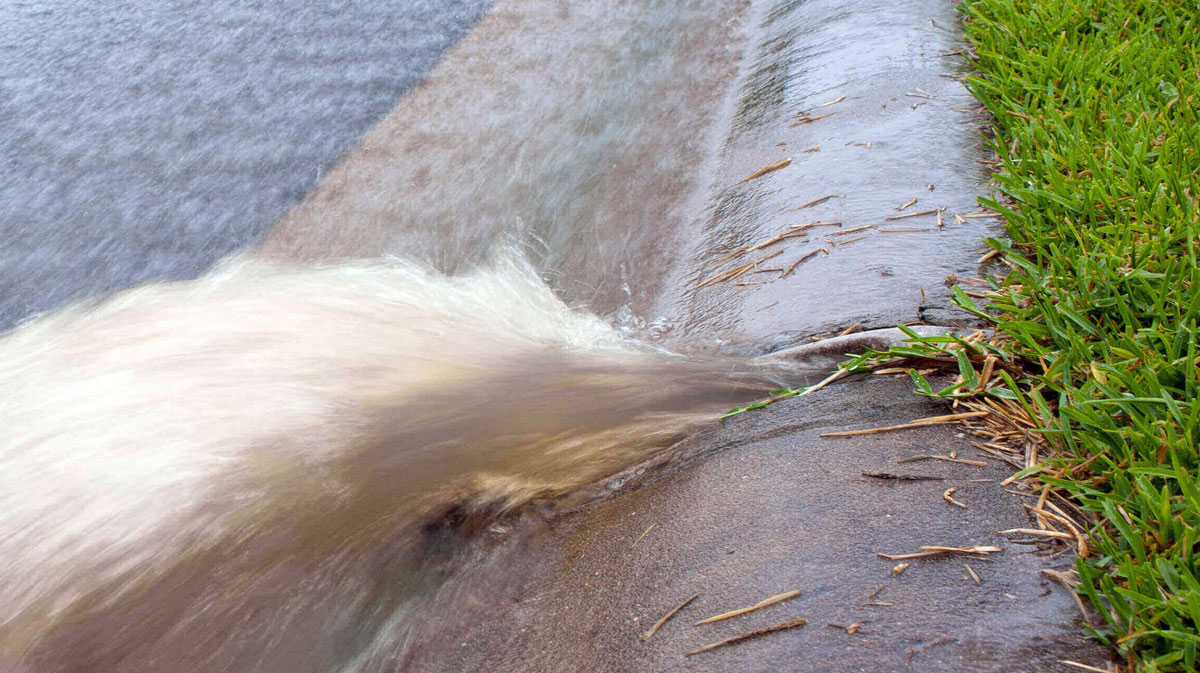Stormwater drainage systems play a crucial role in maintaining a safe and functional environment. These systems are designed to collect and divert rainwater away from residential and commercial areas, preventing flooding and ensuring the well-being of our communities.
However, even the most well-maintained stormwater drains can encounter issues, with one of the most common problems being blockages. When stormwater drains become blocked, it can lead to a range of issues, including water pooling, damage to infrastructure, and even the potential for property damage.
But fear not, as there are solutions at hand to tackle these blockages head-on. In this informative article, we will dive into the causes of blocked stormwater drains, identify warning signs, and provide effective methods to prevent and clear blockages, ensuring the smooth flow of stormwater and safeguarding against potential disasters.
Causes and Signs of Blocked Stormwater Drains
Blocked stormwater drains can cause numerous issues and inconveniences in residential and commercial areas. Being aware of the causes and signs of blocked stormwater drains is essential in preventing further complications and addressing the problem promptly. Here are the common causes and signs to watch out for:
Causes of a blocked stormwater drain
- Accumulation of leaves, debris, and trash: Over time, leaves, debris, and trash can accumulate in stormwater drains, leading to blockages. This is especially common after a storm which is a regular occurrence in summer on the North Shore of Sydney.
- Tree roots intrusion: Tree roots can gradually infiltrate stormwater drains, causing blockages and even pipe damage.
- Soil, silt, and sediment buildup: Stormwater drains can become clogged due to the accumulation of soil, silt, and sediment.
- Foreign objects or materials blocking the drain: Sometimes, foreign objects or materials such as plastic bags, toys, or construction debris can obstruct stormwater drains.
Signs of a blocked stormwater drain
- Slow drainage or puddling in the area: If the water takes longer to drain or puddles form around the stormwater drain, it may indicate a blockage.
- Unpleasant odour or stagnant water: A blocked stormwater drain can produce foul smells or result in stagnant water, attracting insects and causing a health hazard.
- Gurgling sounds in plumbing fixtures: If you hear gurgling sounds coming from your sinks, toilets, or showers, it could be a sign of a blocked stormwater drain
- Overflowing gutters or downspouts: When stormwater drains are obstructed, the excess water may cause gutters and downspouts to overflow.
Understanding the causes and signs of blocked stormwater drains allows you to take appropriate measures to prevent blockages, avoid further damage to the drainage system, and ensure the efficient flow of stormwater.
How to Clear Blocked Stormwater Drains
When it comes to stormwater drains, blockages can be a frustrating and messy issue. If you notice water pooling or overflowing in your property, it’s crucial to clear the blockage before it causes further damage. Here are some effective methods for clearing blocked stormwater drains:
- Identifying the Blockage: Locate the blockage by checking areas where water is not draining properly. This could be in the drain itself, gutters, or downpipes.
- Gathering Tools: Prepare tools like a plunger, snake auger, drain rods, and protective gloves. These are essential for physically removing the blockage.
- Removing Visible Debris: Clear any debris you can see at the top of the drain. This might include leaves, twigs, or other materials that have accumulated.
- Using a Plunger: Use the plunger to create pressure and suction, helping to dislodge the blockage in the drain.
- Inserting a Drain Rod: If plunging doesn’t work, use a drain rod. Push it into the drain to break up the blockage.
- Flushing with Water: After attempting to clear the blockage, flush the drain with water to check if it’s cleared.
- Repeating if Necessary: If the blockage persists, repeat the plunging and rodding process.
- Inspecting Gutters and Downpipes: Check and clear gutters and downpipes regularly to prevent blockages.
- Regular Maintenance: Regularly maintain your stormwater system to prevent future blockages.
Advanced Techniques for Clearing Blocked Stormwater Drains
- Baking Soda and Vinegar: Ideal for mild clogs. The reaction between baking soda and vinegar helps dislodge blockages.
- Chemical Drain Cleaners: Use these as a last resort. They are potent and require careful handling. Popular choices are Drano Max Gel and Selleys Complete Clean Power Gel Drain Cleaner.
- Drain Snake: Effective for tougher clogs. It physically breaks down the obstruction.
- Professional Help: Recommended for severe blockages or root intrusion. Licensed Plumbers, like the team at North East Plumbing, are experts at clearing blocked drains and have the necessary tools and expertise.

Who is responsible for cleaning blocked stormwater drains in Sydney?
In Sydney, responsibility for blocked stormwater drains depends on the location of the blockage and property ownership. Tenants are accountable for blockages due to their actions, while landlords handle issues from natural wear or unknown causes. Homeowners bear the cost on their property, and the council addresses public space issues.
Effects of Blocked Stormwater Drains
Blocked stormwater drains can have numerous negative effects on the surrounding environment and local ecosystem, as well as pose risks to human health and property.
Impact on the environment and local ecosystem
When stormwater drains become blocked, the excess water cannot flow freely, leading to pooling and stagnant water. This stagnant water can create an ideal breeding ground for mosquitoes, flies, and other insects. Additionally, the buildup of debris and pollutants in the drains can contaminate the water, affecting the quality and health of the surrounding environment.
Pollution of water bodies due to stagnant water
Stagnant water resulting from blocked stormwater drains can eventually overflow and lead to pollution of nearby water bodies. This can harm aquatic life and disrupt the delicate balance of the ecosystem. The pollution can also flow into rivers, lakes, or oceans, impacting marine life and even affecting human activities such as fishing and swimming.
Increased risk of flooding and property damage
Blocked stormwater drains are unable to efficiently drain away excess water during heavy rainfall. This can result in the accumulation of water on roads, car parks, and even residential areas including garden beds. The increased risk of flooding not only poses a threat to public safety but can also cause severe property damage, including structural damage, water infiltration, and the destruction of valuable belongings.
Potential health hazards caused by standing water
Standing water due to blocked stormwater drains can become a breeding ground for harmful bacteria and pathogens. These can lead to the spread of diseases, putting the health of individuals at risk. Furthermore, the presence of standing water can also create a slippery surface, increasing the likelihood of accidents and injuries.
It is crucial to address blocked stormwater drains promptly to mitigate these effects and safeguard the environment, public health, and property.
Preventive Measures to Avoid Blocked Stormwater Drains
Preventing blocked stormwater drains is crucial in maintaining the functionality of drainage systems and avoiding potential damages. Here are some proactive steps that property owners can take to prevent blockages:
- Regularly cleaning and inspecting gutters and downpipes: Leaves, twigs, and other debris can accumulate in gutters and downpipes, leading to blockages. Regularly cleaning and inspecting these areas can help prevent blockages from forming.
- Installing grates or guards to prevent debris accumulation: Installing grates or guards over stormwater drains can help prevent leaves, litter, and other debris from entering the drains and causing blockages.
- Minimising the use of harmful chemicals or pollutants: Chemicals and pollutants can adversely affect the stormwater drainage system. Minimizing the use of harmful chemicals and pollutants can help maintain the integrity of the system and prevent blockages.
- Encouraging community awareness and participation in stormwater management: Raising awareness among the community about the importance of proper stormwater management can help prevent blockages. Encouraging participation in initiatives such as regular clean-ups and education campaigns can have a significant impact on preventing blockages in the long run.
If you would like a licensed plumber to unclog your blocked drain for you, give us a call today! With our fast same-day service and Lifetime Labour Guarantee, you are in safe hands with the team from North East Plumbing.
